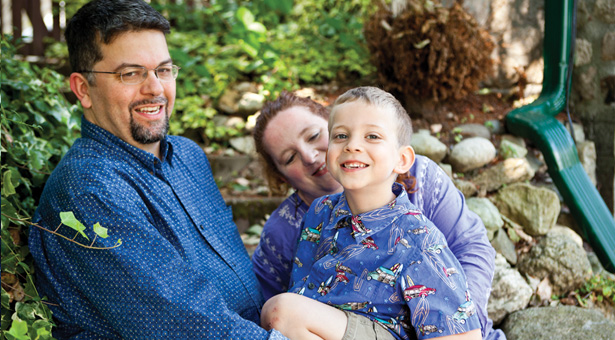Home & Family Improving Daily Life
A Family Affair
Autism Research Benefits Parents, Teachers
By Hope McPherson (hmcpherson@spu.edu)

Martin and Sarah Stillion participated in the Young Children’s Self Regulation, a study in SPU’s School of Psychology, Family, and Community, with their son, Sebastian (right). “I was glad to see this research is being conducted at SPU,” says Martin.
One Sunday after church, Martin Stillion ’92 and his wife, Sarah, brought their 5-year-old son,
Sebastian, to the Seattle Pacific University campus. The little boy was one of 60 children between
3 and 6 years old — half diagnosed with autism spectrum disorders — participating in the Young Children’s Self-Regulation Project. For the next 90 minutes, Sebastian played “waiting games” in a psychology lab in Marston Hall with an SPU researcher.
How do kids with autism spectrum disorder cope with a tough situation — such as waiting for something they want? They may try sitting on their hands or whistling. By observing young children’s coping strategies, researchers can develop behavior interventions for parents and teachers to help children with ASD better adjust in school and at home.
“One out of 110 kids is diagnosed with ASD — a huge increase from 10 years ago,” says Professor of Clinical Psychology Beverly Wilson. “In our project, we’re not studying the causes of ASD. We’re trying to find ways to help children and their parents increase their children’s social skills, manage stress, and cope with the real world.”
Like other research studies at Seattle Pacific, the Young Child Self-Regulation Project has a lead faculty researcher and several student researchers. Rachel Montague, who completed her doctorate in clinical psychology at SPU in 2011, found her dissertation proposal led to the creation of this study. Other graduate students are taking leadership roles in the project, she explains, and “a fabulous team of undergraduate student researchers” interviews families, collects data, and provides administrative support.
When the Stillions heard about the study from Natty Plunkett, an SPU senior and psychology
major, they decided to participate with Sebastian, who was diagnosed with ASD at age 3. “It’s hard to see where your child is in his progress until you see someone else taking him through tests,” says Sarah. In this first year of the two year study, each child visited the psychology lab. While there, each child — wearing equipment to measure heart rate and how much their hands were sweating — did various activities such as listen to a parent read aloud or follow instructions aimed at gauging the child’s ability to wait.
In one task, Sebastian was asked to wait seven minutes before eating a small number of fruit snacks. If he waited the entire time, he could have as many as he wanted. If he couldn’t wait, he would get only the few on the table. “I was really surprised that he was able to wait seven minutes,”
says his dad. “He understood and he waited.” And he received an entire bag of fruit snacks.
The first study was done as part of the new Initiative for Individuals With Intellectual and Developmental Disabilities. The self-regulation project is already doing something Mícheál Roe, dean of the School of Psychology, Family, and Community, has envisioned for years.
“We see this initiative reaching out into the local community,” says Roe. “We see this ultimately being a catalyst for ongoing communications among parents, families, advocates, and educators in the field.”
